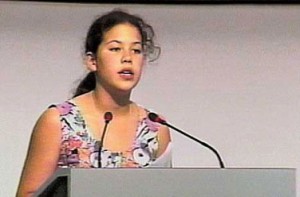Rio+20 – The Young Can’t Wait
By William Becker
June 12, 2012
It was 20 years ago this month that Severn Suzuki, then 12, gave the speech of her life. As she stood on the podium at the first Earth Summit, Severn’s admonition to dignitaries from 178 nations also became the speech of her generation.
The topic was sustainable development. The place was Rio de Janeiro, where heads of state, delegates and negotiators assembled to consider how humankind and the rest of the natural world could co-exist, to the everlasting benefit of both.
Ten years later, Severn recalled the experience and assessed the world’s progress in a column for TIME magazine:
“I am only a child,” I told them. “Yet I know that if all the money spent on war was spent on ending poverty and finding environmental answers, what a wonderful place this would be. In school you teach us not to fight with others, to work things out, to respect others, to clean up our mess, not to hurt other creatures, to share, not be greedy. Then why do you go out and do the things you tell us not to do? You grownups say you love us, but I challenge you, please, to make your actions reflect your words.”
I spoke for six minutes and received a standing ovation. Some of the delegates even cried. I thought that maybe I had reached some of them, that my speech might actually spur action. Now, a decade from Rio, after I’ve sat through many more conferences, I’m not sure what has been accomplished. My confidence in the people in power and in the power of an individual’s voice to reach them has been deeply shaken.
Later this month, international negotiators and heads of state will meet again in Rio to assess progress over the last two decades and to discuss new commitments. The theme of Rio+20, as the conference is unofficially called, is “The Future We Want” — an invocation, perhaps, of Buckminster Fuller’s observation that “we are called to be architects of the future, not its victims.”
Severn’s name today is Severn Cullis-Suzuki. She is married and has her own child. If she were invited to the podium at Rio+20, what would she say? We asked her. Green Cross International taped her answer for The Future We Want project.
Among many other points, she repeats what she told negotiators in 1992: Achieve intergenerational justice by making your actions reflect your words. “The young can’t wait,” she said then.
But the young are still waiting. There have been many more words than actions these past 20 years. The original Earth Summit produced Agenda 21, the Rio Declaration on Environment and Development, the Statement of Forest Principles, the UN Framework Convention on Climate Change and the UN Convention on Biological Diversity. New institutions were created, including the Commission on Sustainable Development, the Inter-Agency Committee on Sustainable Development and the High-Level Advisory Board on Sustainable Development.
Nevertheless, the United Nations Environment Programme (UNEP) concluded in an analysis released last week that the world “continues to speed down an unsustainable path despite over 500 internationally agreed goals and objectives to support the sustainable management of the environment and improve human wellbeing.” Significant progress has been made on only four of the 90 most important commitments to sustainability, UNEP reported.
Delegates from around the world, about 130 heads of state and government, and tens of thousands of leaders in business, cities and non-government groups, are expected to attend Rio+20 and the events surrounding it. Among them will be thousands of young people, the Severns of today. I expect that many of them are full of hope, while others are frustrated that they are being handed a world in which security, peace, genuine prosperity, social justice and sustainability remain aspirations rather than realities.
The question is not whether youth will have a voice at Rio+20. They will. The question is whether the delegates will listen. After the original Earth Summit, the UN created a Major Group for Children and Youth, one of nine groups established to represent the “voice of civil society”. Policy ideas for Rio+20 have been developed by organizations such as Peace Child International and initiatives such as Rio+Twenties and Road to Rio+20. Organized under the framework of the Road to Rio+20 initiative last year, young people also developed recommendations at regional meetings in Borneo, Malaysia, Indonesia, India, China, Estonia, Singapore, Nepal, Ghana, Slovenia, South Korea, Argentina and Qatar.
The 6th World Youth Congress (including its virtual conference on the web) and Youth Blast already have kicked off this month’s events in Rio. And in an exhibit The Future We Want project is staging inside the official conference venue, young people will showcase solutions and visions from more than 50 countries.
Secretary General Ban Ki-moon not only encourages their aspirations; he shares them. He has made sustainable development his No. 1 priority and “The Future We Want” a theme for his upcoming years at the UN. At a news conference on June 6, the Secretary General said:
We aspire to nothing less than a global movement for generational change. We need world leaders to make the issues on the table at Rio+20 their own personal priority. Nothing else will do… I expect concrete outputs from Rio — outcomes that will improve the lives of real people around the world… Sustainable development is an idea whose time has come. It is the future we want.
Unconstrained by diplomacy, I would put it this way: If we insist on ruining the planet, we can no longer call ourselves the most intelligence species. We have the tools, but we’re not fully using them. We know what to do, but we’re not doing it. We all bear some responsibility for that, and we all should be part of the solution.
As for our leaders, they need to do more than weep at the words of our children. They need to turn words into action. Really soon.
###
With his partner Jonathan Arnold, Bill Becker is co-director of The Future We Want, a private-sector project that’s facilitating a global conversation about the future. It also is demonstrating how cutting-edge visual arts and technologies can be used to help people envision what their lives and communities would be like in a more sustainable world.
vvlx,
hentai,
xporn,
xnxx,
sex việt,
Family Practice Doctors Near Me,
Ratify Treaties,
Best Hookup Apps,
Brunch On A Wednesday,
Comfortzone,
Plaza Premium Lounge Orlando Reviews,
Catering 77002,
Cauliflower And Coconut Curry,
Usa Rail Pass,
Active Duty Service Member,
Patch American Flag,
Farfetch Coupon Code,
Connect Google Mini,
Nike Mens High Top,
Bronny James Usc Basketball,
Anal Sex Prep,
Aesports,
Check Balance On Debit Card,
Add People Trustpilot,
Skype Ids,
← Ban Ki-moon – The Future We Want






